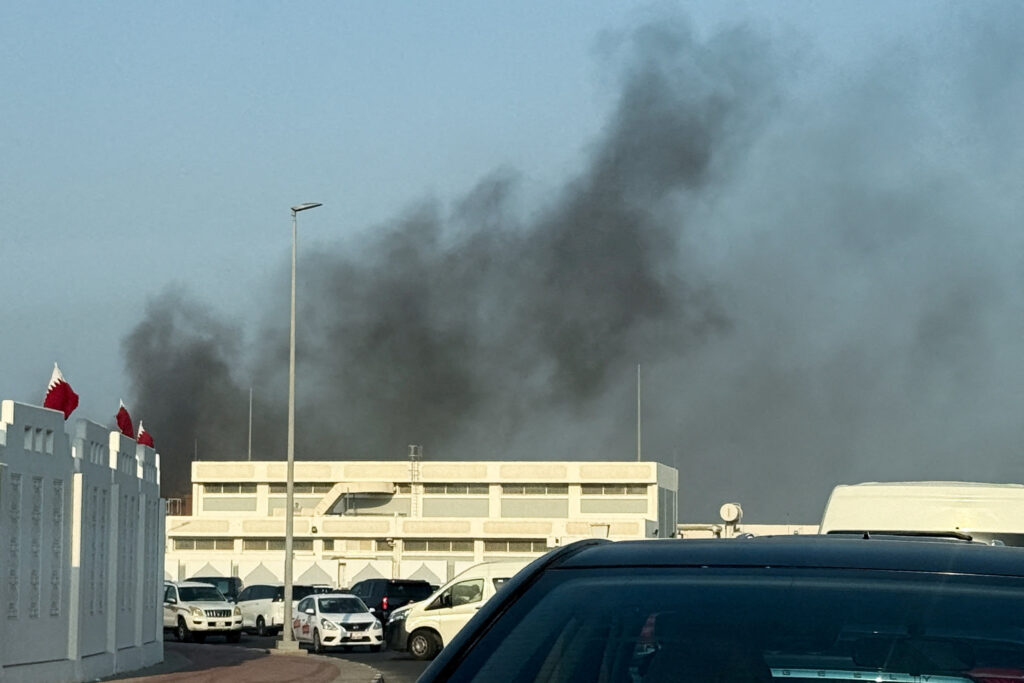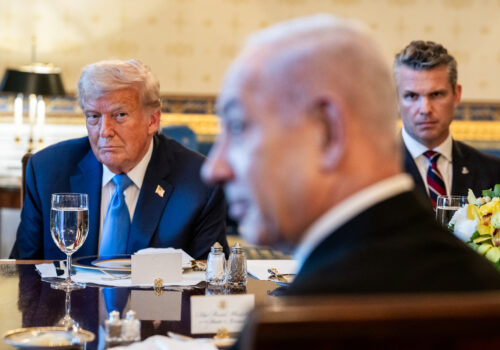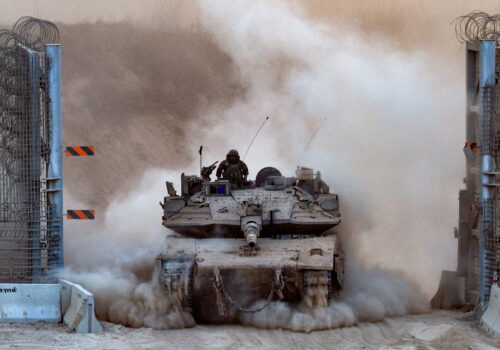JUST IN
“Israel initiated it, Israel conducted it, and Israel takes full responsibility.” That’s what Israeli Prime Minister Benjamin Netanyahu said Tuesday after launching strikes targeting senior members of Hamas’s political leadership in Doha, Qatar. The unprecedented Israeli attack in Qatari territory comes as Israel is preparing to launch a full-scale invasion of Gaza City and the Trump administration is pressing Hamas to accept US terms for a cease-fire and hostage-release deal. US President Donald Trump criticized the Doha strike as not helpful to US or Israeli goals, as Hamas indicated that its top leadership survived the attack. So what’s next for Israel’s campaign against Hamas? And how will Qatar, a key mediator between Israel and Hamas, respond to the attack? Our experts share their insights below.
TODAY’S EXPERT REACTION BROUGHT TO YOU BY
- Daniel B. Shapiro (@DanielBShapiro): Distinguished fellow with the Atlantic Council’s Scowcroft Middle East Security Initiative and former US ambassador to Israel
- Ahmed F. Alkhatib (@afalkhatib): Director of the Council’s Realign For Palestine project and native of Gaza City
- Thomas S. Warrick (@TomWarrickAC): Nonresident senior fellow with the Scowcroft Middle East Security Initiative and former deputy assistant secretary for counterterrorism policy in the US Department of Homeland Security
- Jennifer Gavito: Nonresident senior fellow with the Scowcroft Middle East Security Initiative and former US acting principal deputy assistant secretary of state for Near Eastern affairs
Israel’s thinking
- Ever since the Hamas-led attack on Israel on October 7, 2023, members of the group’s external leadership have been “dead men walking,” notes Dan, given Israel’s ability to find and target them. “What kept them alive for this long was their role in negotiations to free Israeli hostages,” Dan tells us. “And on that front,” he adds, “they proved to be limited in their utility” after multiple rounds of failed negotiations.
- The decision to target Hamas’s political leadership, which followed Monday’s Hamas terrorist attack at a bus stop in Jerusalem, “may signal that Israel no longer believes there will ever be a viable cease-fire and hostage deal in Gaza,” says Ahmed.
- In Tom’s assessment, the strike “will probably not bring the end of the war in Gaza any closer, but it won’t push it further away either.” That’s because any plans for the postwar reconstruction of Gaza “will not start until Hamas is disarmed, and that depends on decisions by Hamas’s military leaders in Gaza, not its political leaders in Doha.”
Sign up to receive rapid insight in your inbox from Atlantic Council experts on global events as they unfold.
Regional reaction
- As Jen notes, the strikes “upended Qatar’s role as a critical mediator” in the Israel-Hamas war, with Doha announcing that it is suspending its role in the talks in the aftermath of the attack.
- Saudi Crown Prince Mohammed bin Salman also took Qatar’s side following the attack, which Jen says is noteworthy considering that only two years ago, Riyadh was “on the precipice of a normalization agreement” with Israel.
- “Only negotiations and greater normalization [with Arab neighbors] can bring about the long-term peace and security that Israel seeks,” Jen writes. “Each strike in contravention of international law diminishes Israel’s credibility as a negotiating partner.”
- Ahmed points out that the strikes took place not far from Al Udeid Air Base, which is home to US Central Command, placing the United States in a “delicate position vis-à-vis its strong Gulf ally.”
What’s next?
- Following this strike, “Hamas no longer will feel safe anywhere it operates, even on the soil of a major non-NATO ally like Qatar,” Ahmed observes.
- And with the attack coinciding with an imminent invasion of Gaza City, Ahmed adds, this could mark “the beginning of the end of Hamas’s existence as a cohesive entity with territory and external leadership that could operate freely without repercussions.”
- According to Dan, the strike on Hamas negotiators and forthcoming Gaza City invasion “bode poorly” for the remaining hostages in Gaza. “We are closer than we have been at any point in the war to an Israeli reoccupation of Gaza, with all that likely means for hostages, Palestinian civilians, Israeli soldiers, and the challenge of shifting to any kind of sustainable day-after arrangement.”
- Jen warns that any “short-term success” by Israel in targeting Hamas officials, “if that is what today was, may yet bring more long-term pain.”
Further reading
Thu, Aug 21, 2025
Israel’s Gaza City operation will leave it more isolated. It’s time for a course correction.
New Atlanticist By Jonathan Panikoff
An operation to take Gaza City would mark a dramatic escalation in the conflict—and one with potentially irreversible costs to Israel’s alliances and reputation.
Tue, Aug 19, 2025
How Trump can drive an end to the war in Gaza
New Atlanticist By Daniel B. Shapiro
A narrow opportunity exists to avoid stretching the Gaza tragedy into 2026. The US president needs to seize it.
Fri, Aug 8, 2025
Israel’s gamble in Gaza City signals a push toward negotiation—but risks a long insurgency
New Atlanticist By Alex Plitsas
Israel’s decision to occupy Gaza City is aimed at ending its war with Hamas. But without careful planning, it risks starting a new conflict against a brewing insurgency.
Image: Smoke rises after several blasts were heard in Doha, Qatar, September 9, 2025. REUTERS/Ibraheem Abu Mustafa.




